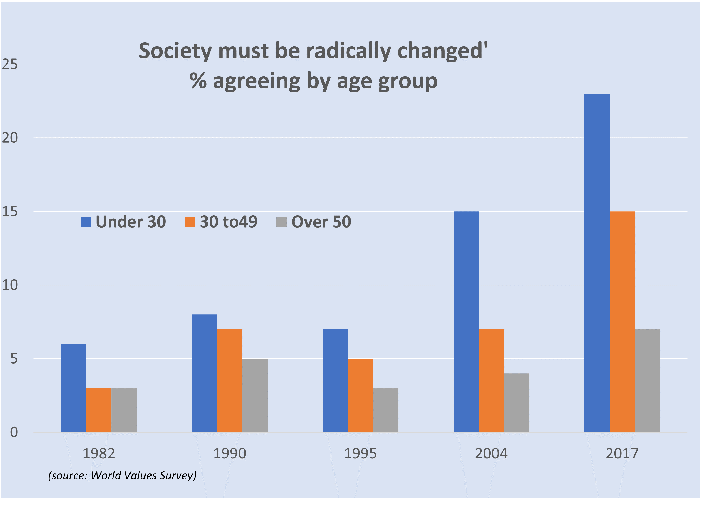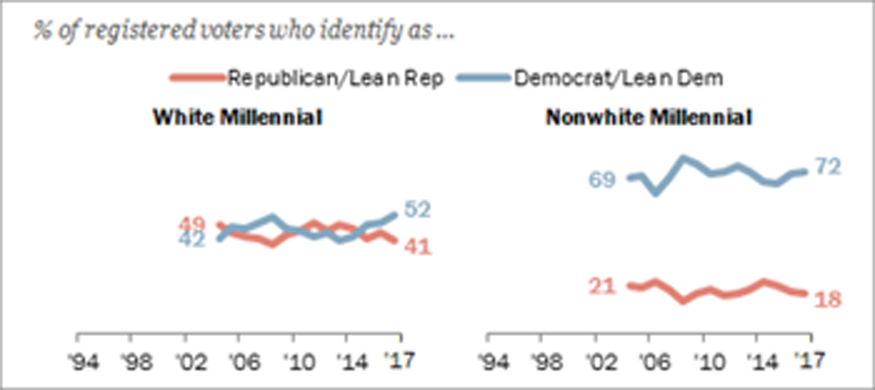It’s a reasonable question to ask: Is Republican demographic doom inevitable? That’s what some trends seem to say.
But extrapolating trends to predict the future is foolhardy, and one of the reasons why scenario planning is such an effective approach to strategic foresight.
In the months leading up to the recent US elections, much was written about the Millennial generation’s liberal instincts, and their preference for Democratic candidates, prompted perhaps by polling data that seemed to strongly bear this out. It’s something we have written about ourselves here and here and given this cohort’s size and composition it could be tempting to jump on the bandwagon and predict a long-term Republican exile from political significance and power.
There seems to be plenty of data to support this conclusion. According to the World Values Survey, a global research project that explores people’s values and beliefs and how they change over time, adults under 30 in the US have moved steadily to the left since the first wave of research. Asked to place themselves on a political scale from 1 (most liberal) to 10 (most conservative), nearly three times as many young adults placed 1,2 or 3 in 2017 than in 1981 (32% vs. 12%).
And in the same study, 23% of under-30s agree that society must be radically changed, whereas in 1981, only 6% agreed.
 Why the change? Part of this is down to Millennials’ life experience, which has given them 9/11, two wars, the financial depression, COVID-19, and crushing student debt. They’ve also lived through a technology revolution, with social media becoming a dominant force in news, commerce, attitudes, and interpersonal communications. And there’s the fact that a much larger proportion of Millennials have been to college – more than 60%, compared to 45% of Boomers in 1982.
Why the change? Part of this is down to Millennials’ life experience, which has given them 9/11, two wars, the financial depression, COVID-19, and crushing student debt. They’ve also lived through a technology revolution, with social media becoming a dominant force in news, commerce, attitudes, and interpersonal communications. And there’s the fact that a much larger proportion of Millennials have been to college – more than 60%, compared to 45% of Boomers in 1982.
But by far the biggest reason is that they are more ethnically diverse.
 Only 56% of Millennial. (and just over 50% of ‘Zs’) are white, compared with 75% of over-55s. This is significant, as according to Pew Research, the gap between the percentage identifying as Democrat rather than Republican is far larger, and more stable over time among non-white than white millennials (see chart). This gap between non-whites and whites is the largest across all demographic categories (gender, education, religious affiliation, urban/suburban/rural). So, to the extent that there is a swing toward the Democrats in years to come it will have at its root much more to do with race and ethnicity than anything else.
Only 56% of Millennial. (and just over 50% of ‘Zs’) are white, compared with 75% of over-55s. This is significant, as according to Pew Research, the gap between the percentage identifying as Democrat rather than Republican is far larger, and more stable over time among non-white than white millennials (see chart). This gap between non-whites and whites is the largest across all demographic categories (gender, education, religious affiliation, urban/suburban/rural). So, to the extent that there is a swing toward the Democrats in years to come it will have at its root much more to do with race and ethnicity than anything else.
In fact, the more that you dig into the data, the more skeptical you become of generational cohorts, particularly with respect to determinism in politics and voting behavior. Insofar as there are voting ‘blocs’, they have to do with shared interests around key issues, which in many cases are economic, and in turn driven by life-course. Parenthood and its attendant worries and financial concerns can figure largely in driving voting decisions – hence James Carville’s “It’s the economy, stupid” observation. It is also one reason that young voters traditionally have a low turnout – consistently at least 20 points lower than older age groups. Since relatively few are parents the perceived effects of election outcomes on their lives is correspondingly lower.
Of course, voting behavior is not just about economics, or parenthood. A lot of party affiliation is inherited. And there are cultural anxieties and emotional issues at play, all affecting the extent to which people identify with a candidate or a party. There are distinct gender differences, too, with a majority of women in virtually every category identifying as Democrat. Finally, there is the actual performance in office; if Democrats screw up and fail to deliver on their promises, Millennials would be on the hunt for alternatives – in a political environment that’s likely to bear little resemblance to what exists today.
So, a Democratic resurgence, if one were to materialize, would not force the Republican party to exit the stage. The GOP would inevitably regroup and re-imagine itself – think about New Labour under Tony Blair – perhaps with a young, charismatic non-white leader. Alternatively, with increased polarization, a new overtly pragmatic “common sense” party might eventually emerge to fill an abandoned political center. FSG has discussed political disequilibrium before back in 2016, and we reach the same conclusion now as then- “we cannot know the future, but that doesn’t mean we should retreat from trying to prepare for it. Scenario planning, the creation and exploration of alternative futures, is the best way we know for an organization to embrace uncertainty, using uncertainty itself as a lever to deal with the future, and plan effectively.”
And here we must re-emphasize our strategic foresight instincts regarding the extrapolation of trends. It is neither possible nor wise to make the ‘ceteris paribus’ assumptions which predictions inevitably entail. It is the cross-impact of trends with other trends and ‘events’ that shape the future, something that 2020 has emphatically underlined.

It may be true that
It may be true that demographic trends are among the most reliable and predictable. But the implications of those trends — as this essay effectively underlines — are anything but predictable. Among the surprises of the 2020 election were Trump’s gains across a diverse set of Hispanic communities. So much for a monolithic Latino vote! Detailed election data should provide important insights into what’s happening here. And Democrats will be smart to pay attention. In politics as in many other aspects of our complex lives, very few things are quite what they seem.
The Latino gains for Trump
The Latino gains for Trump were largely from older, non-college educated people from Miami Dade and the Texas Rio Grande who were convinced by Trump’s lies about a lawless socialist state. The coming wave of younger and better educated Latinos are far more liberal.
Great piece in complex times.
Great piece in complex times. I am reminded of the Harvard University father – son duo of Arthur M. Schlesinger Sr/Jr. Arthur Sr. was a historian who may have been the first credited with tracing cyclical patterns in the U.S. political process.
As historians, theirs was a descriptive effort, nothing so exciting, or fraught, as our current attempts in social science to venture into causal explanations, predictions, or scenario planning.
Keep providing these insights.
Thanks Charles – we’ll do our
Thanks Charles – we’ll do our best to continue providing the insights. I am reminded of the introduction to Edward Tufte’s early book – ‘Data Analysis for Politics and Policy’ in which he at pains to point out that analysis of data does not make a study more ‘scientific’ or ‘rigorous’ or ‘objective’. I think we are increasingly in thrall to analytics in general, and prepared to believe it is all of those things.
Great piece of analysis.
Great piece of analysis. However, I would point out a common mistake made in political and sociodemographic analysis made in the US. “Latino” is an abstraction that does not exist. It is, in fact, an attempt to synthesize race (DNA), cultural identity, common language and color of skin. Problem is, Latinos are not of the same race, of the same cultural identity by family origin and certainly not of the same “color of skin”. Unfotunately, in polictical analysis this has a significant consequence as clearly, this last election showed (at least to Latinos) for the nth time that Cubans are not the same Mexicans, which are not the same as Puerto Ricans which are different (in some cases massively) from Dominicans. Even more relevant than that is that Latinos have a consistently conservative base that, if you want to trace it back, originates in the religious conservatisms of the Spaniers back 3 or 4 centuries ago (US analysts must not forget that Spain was the natural base of the inquisition and in the XX century had 40 years of the purest form of fascism). I think this is the starting point of the weight that US Latinos will play in the future of the Republica party. I think the conversation is just beginning.
Diego, I couldn’t agree with
Diego, I couldn’t agree with you more — “Latino” is an abstract, mostly meaningless, concept, as much of the rest of the US political world is now just discovering. Your point about the “consistently conservative base” and it’s origins is also salient in the context of the current political discussion about future political attitudes of the different Spanish-speaking groups in this country. Yes, the conversation is just beginning. Thanks for your thoughtful comment.
Thanks Diego, very good
Thanks Diego, very good points. I was aware of the distinctions you make here, but we try to keep the word count manageable. You are right – every grouping breaks down on closer analysis, and it will be interesting to see if there is a steady further ‘Latino’ migration to the Republicans. My colleague Pete Kennedy has a more extensive knowledge of Latin America in general – I’m sure he will comment further.